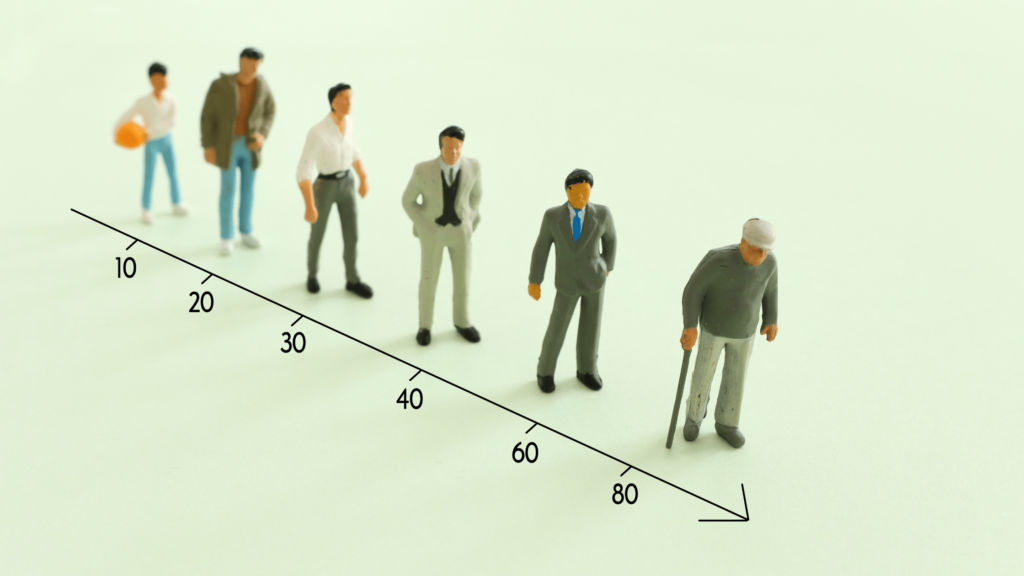Life takes its toll on everyone, but for those working in environments filled with harsh chemicals, pollutants, and stress, the effects of aging can hit harder and faster. While there’s no magic solution to stop the clock, the right nutrients can change how you look and feel as the years pass. Vitamin D is a powerhouse for keeping your body resilient, your mind sharp, and your aging process on the right track.
Quick look
- Vitamin D helps regulate inflammation, boost immunity, and combat oxidative stress, slowing the aging process at the cellular level.
- Exposure to toxins, pollutants, and physical stress accelerates aging, making adequate vitamin D levels critical for maintaining resilience and health.
- Vitamin D supports bone density, muscle strength, and cellular repair, while deficiency can lead to fatigue, weakened immunity, and accelerated aging.
- Safe sun exposure, vitamin-rich foods like fatty fish, fortified milk, and supplements can help maintain optimal levels and support long-term vitality.
What is vitamin D?
Vitamin D is a fat-soluble vitamin that keeps your body strong and functioning at its best. Known as the “sunshine vitamin,” it’s primarily produced in your skin when exposed to sunlight, but it’s also found in certain foods and supplements. While many associate vitamin D with mood regulation and bone health, its impact extends far beyond that.
This nutrient is vital in maintaining immune function, muscle strength, and cellular repair. It’s involved in critical processes that keep your body running smoothly, making it essential for health and vitality.
Why it matters
As we age, oxidative stress and inflammation become more pronounced, contributing to everything from joint stiffness to visible signs of aging like wrinkles and dull skin. Vitamin D is your body’s secret weapon against these processes. It helps reduce inflammation, protects cells from oxidative damage, and keeps your immune system strong—all of which can slow down aging.
For men and women working in physically demanding jobs or environments with high exposure to toxins and pollutants, vitamin D’s protective properties are even more crucial. It helps buffer the body from these external stressors, ensuring you stay healthier and more resilient as the years go by.
The aging process

Aging is more than just getting wrinkles or feeling stiffer in the mornings—it’s a complex process that starts at the cellular level. Over time, your cells accumulate damage from everyday wear and tear. Key culprits include oxidative stress, where harmful molecules called free radicals attack your cells, and DNA damage disrupts how your body repairs and regenerates itself.
Cellular aging and oxidative stress
Cells naturally age as they divide and replicate. However, oxidative stress speeds up this process, leading to earlier signs of aging and an increased risk of age-related diseases. Think of it like rust forming on a piece of metal—without the proper protection, the damage compounds over time, affecting everything from your skin to your heart.
External factors that accelerate aging
While aging is inevitable, certain external factors can put your body on the fast track:
- Toxins and pollutants: Frequent exposure to chemicals, heavy metals, and other pollutants in industries like manufacturing or construction can overwhelm your detoxification systems and your body’s ability to repair itself.
- UV rays: Long hours working outdoors without proper sun protection lead to skin damage and oxidative stress, contributing to premature wrinkles and a higher risk of skin cancer.
- Environmental pollutants: Airborne particles, smog, and even some worksite materials can cause inflammation and oxidative damage, further accelerating the aging process.
Aging in the trades
Men and women in trade industries face these aging accelerators every day. Whether handling industrial materials, working under the sun, or dealing with air quality issues, external stressors constantly attack their bodies. Without proper care, these factors can add up quickly, leading to visible and internal signs of aging earlier than expected. Taking proactive steps—like ensuring you get enough vitamin D—can be a game-changer in offsetting these challenges.
Vitamin D’s role in aging
Vitamin D isn’t just a feel-good vitamin—it’s a powerful ally in slowing aging and keeping your body strong as the years go by. Here’s how it works its magic:
Regulating inflammation and immune response
Chronic inflammation is one of the biggest drivers of aging and age-related diseases. Vitamin D acts as a regulator, helping to keep inflammation in check by modulating your immune system. This reduces the risk of conditions like arthritis, heart disease, and even cognitive decline, all linked to prolonged inflammation. This regulation is vital for anyone exposed to environmental stressors in protecting the body from long-term damage.
Preserving bone density and preventing frailty
Your bones naturally lose density as you age, making them more prone to fractures and weakness. Vitamin D is crucial for calcium absorption, ensuring your bones stay strong and resilient. For those working in physically demanding industries, maintaining bone health is especially important to prevent injuries and keep you moving with confidence. For women who have gone through menopause, this need becomes even greater.
Slowing down cellular aging
At the cellular level, vitamin D helps combat the processes that accelerate aging. It supports the repair of damaged DNA, reduces oxidative stress, and promotes cellular regeneration. These effects combine to slow the biological clock, keeping your body functioning at its best.
Anti-inflammatory properties
Chronic inflammation is one of the central drivers of aging and age-related diseases. Studies reveal that vitamin D can inhibit the production of pro-inflammatory cytokines while promoting anti-inflammatory pathways. This dual action helps reduce systemic inflammation, contributing to conditions like arthritis, cardiovascular disease, and cognitive decline. For individuals in physically demanding or toxin-heavy industries, this anti-inflammatory effect is especially beneficial in mitigating the long-term impacts of workplace stressors on the body.
Protecting telomeres
Telomeres are protective caps at the ends of chromosomes that naturally shorten as you age. Shorter telomeres are linked to cellular aging, increased disease risk, and reduced lifespan. Vitamin D plays a role in preserving telomere length by reducing oxidative stress and promoting cellular repair mechanisms. Research has shown that individuals with higher vitamin D levels often exhibit longer telomeres, suggesting that this vitamin can act as a biological shield against premature aging.
Cellular rejuvenation
Aging cells accumulate damage over time, leading to dysfunction and slower repair processes. Vitamin D supports cellular rejuvenation through its role in autophagy—a process where the body clears out damaged cells and replaces them with healthier ones. This not only reduces oxidative damage but also helps maintain efficient cellular function. By promoting this natural “clean-up” process, vitamin D helps delay the physical and functional signs of aging.
Vitamin D deficiency
Vitamin D deficiency is a silent epidemic affecting millions of people worldwide. For individuals with limited sun exposure—like those working long hours indoors or in northern climates—deficiency rates are even higher. This lack of vitamin D can have significant consequences for overall health and accelerate the aging process.
Globally, over 1 billion people are estimated to be vitamin D deficient, with approximately 35-50% of adults falling below adequate levels. In industries like construction, manufacturing, or transportation, where workers may spend long hours covered in protective clothing or working in shaded environments, vitamin D levels can be particularly low. A lack of sunlight exposure is a primary culprit, leaving many at risk for health issues that may worsen with age.
Signs and symptoms
Vitamin D deficiency doesn’t always present obvious symptoms, but over time, it can lead to:
- Fatigue: Persistent low energy and tiredness, even after rest.
- Muscle weakness: Difficulty maintaining strength or recovering after physical work.
- Depression: Low vitamin D levels are strongly linked to mood disorders and seasonal affective disorder.
- Weakened immunity: Frequent colds, flu, or infections due to reduced immune function.
- Accelerated aging: Increased inflammation, oxidative stress, and bone density loss.
For individuals exposed to physical and environmental stressors, these symptoms can have a compounding effect on their overall health and well-being.
How much vitamin D do you need?
The recommended daily intake (RDI) for vitamin D varies by age and individual needs:
- Infants (0–12 months): 400 IU
- Children (1–18 years): 600 IU
- Adults (19–70 years): 600 IU
- Older Adults (71+ years): 800 IU
People with darker skin, limited sun exposure, or certain medical conditions may require higher doses to maintain optimal levels.
Safe upper limits
While vitamin D is essential, too much can lead to toxicity. The safe upper limit for most adults is 4,000 IU per day, but always consult a healthcare provider before taking higher doses. Regular blood tests can help determine if you need supplements and how much to take.
Addressing a vitamin D deficiency early can significantly improve energy levels, immune health, and overall resilience, helping you age more gracefully and maintain peak performance at work and in life.
Get more vitamin D

Maintaining adequate vitamin D levels doesn’t have to be complicated. Whether through sunlight, diet, or supplements, there are plenty of ways to ensure your body gets the support it needs.
Sunlight
The simplest and most natural way to get vitamin D is through exposure to sunlight. When your skin is exposed to UVB rays, it produces vitamin D naturally. Here are a few tips for safe and effective sun exposure:
- Spend 10–30 minutes in direct sunlight a few times a week, depending on your skin tone and location. Lighter skin produces vitamin D faster than darker skin.
- Focus on peak times—typically between 10 am and 2 pm—when UVB rays are strongest, but limit overexposure to avoid sunburn.
- Apply sunscreen after the initial exposure to protect your skin while allowing for vitamin D production.
- For trade workers, taking outdoor breaks or scheduling tasks that allow for some sun exposure can help boost levels without disrupting the workday.
Diet
Certain foods can also help you meet your vitamin D needs. Including these in your meals can make a significant difference:
- Fatty fish: Salmon, mackerel, tuna, anchovies, and sardines are excellent natural sources of vitamin D.
- Eggs: Specifically, the yolks contain a good amount of vitamin D.
- Fortified foods: Milk, orange juice, cereals, and plant-based milk alternatives often have added vitamin D.
- Cod liver oil: This is a triple-benefit superfood packed with vitamin D, omega-3 fatty acids, and vitamin A. A single tablespoon can provide more than 100% of your daily vitamin D requirement.
Supplements
If you struggle to get enough vitamin D from sunlight and diet, supplements are a convenient option:
- Types of Vitamin D:
- D2 (ergocalciferol): Plant-based and commonly used in fortified foods, but less effective at raising blood levels.
- D3 (cholecalciferol): Derived from animal sources or lichen (vegan options available) and better at boosting vitamin D levels.
- When to supplement: Consider supplements if you live in a region with limited sunlight, have darker skin, or are at high risk of deficiency due to your work environment.
- Dosage: Consult a healthcare provider for personalized recommendations. Generally, 1,000–2,000 IU daily is safe for most adults, but higher doses may be necessary for those with confirmed deficiencies.
Bottom line
Aging gracefully isn’t about turning back the clock—it’s about taking proactive steps to support your body through the years. For men and women in trade industries, where exposure to toxins, pollutants, and physical stressors can accelerate aging, vitamin D becomes even more essential. It helps combat inflammation, protects your cells, and supports overall health, giving you the tools to stay resilient against the effects of time and harsh working conditions.
Want more? Subscribe to our weekly newsletter for the latest news, insights, and advice delivered directly to your inbox.


